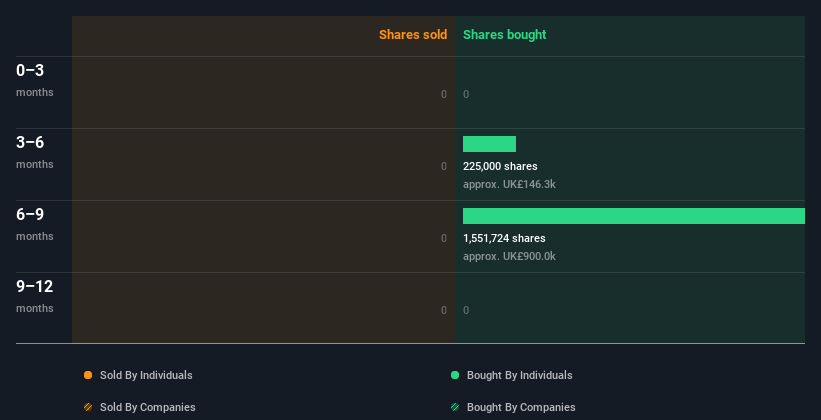Bullish insiders at Capital Limited (LON:CAPD) loaded up on US$1.0m of stock earlier this year
In the last year, multiple insiders have substantially increased their holdings of Capital Limited (LON:CAPD) stock, indicating that insiders' optimism about the company's prospects has increased.
While we would never suggest that investors should base their decisions solely on what the directors of a company have been doing, logic dictates you should pay some attention to whether insiders are buying or selling shares.
See our latest analysis for Capital
The Last 12 Months Of Insider Transactions At Capital
In the last twelve months, the biggest single purchase by an insider was when Executive Chairman & CEO Jamie Boyton bought UK£750k worth of shares at a price of UK£0.58 per share. Even though the purchase was made at a significantly lower price than the recent price (UK£0.77), we still think insider buying is a positive. While it does suggest insiders consider the stock undervalued at lower prices, this transaction doesn't tell us much about what they think of current prices.
While Capital insiders bought shares during the last year, they didn't sell. You can see a visual depiction of insider transactions (by companies and individuals) over the last 12 months, below. If you want to know exactly who sold, for how much, and when, simply click on the graph below!
There are plenty of other companies that have insiders buying up shares. You probably do not want to miss this free list of growing companies that insiders are buying.
Insider Ownership of Capital
Looking at the total insider shareholdings in a company can help to inform your view of whether they are well aligned with common shareholders. I reckon it's a good sign if insiders own a significant number of shares in the company. Capital insiders own about UK£38m worth of shares. That equates to 26% of the company. While this is a strong but not outstanding level of insider ownership, it's enough to indicate some alignment between management and smaller shareholders.
What Might The Insider Transactions At Capital Tell Us?
It doesn't really mean much that no insider has traded Capital shares in the last quarter. On a brighter note, the transactions over the last year are encouraging. Overall we don't see anything to make us think Capital insiders are doubting the company, and they do own shares. While we like knowing what's going on with the insider's ownership and transactions, we make sure to also consider what risks are facing a stock before making any investment decision. Our analysis shows 3 warning signs for Capital (1 is concerning!) and we strongly recommend you look at them before investing.
Of course, you might find a fantastic investment by looking elsewhere. So take a peek at this free list of interesting companies.
For the purposes of this article, insiders are those individuals who report their transactions to the relevant regulatory body. We currently account for open market transactions and private dispositions, but not derivative transactions.
This article by Simply Wall St is general in nature. We provide commentary based on historical data and analyst forecasts only using an unbiased methodology and our articles are not intended to be financial advice. It does not constitute a recommendation to buy or sell any stock, and does not take account of your objectives, or your financial situation. We aim to bring you long-term focused analysis driven by fundamental data. Note that our analysis may not factor in the latest price-sensitive company announcements or qualitative material. Simply Wall St has no position in any stocks mentioned.
Have feedback on this article? Concerned about the content? Get in touch with us directly. Alternatively, email editorial-team (at) simplywallst.com.

 Yahoo Finance
Yahoo Finance 
